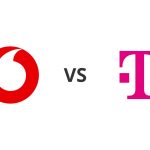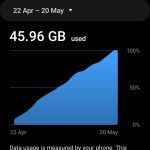With the increasing availability of 5G technology throughout Europe, you might be wondering which is best – fixed broadband, or mobile broadband.
In this article, we’ve explained some of the key differences between fixed-line and mobile broadband. We’ve explained the advantages and disadvantages of each type of technology.
Let’s get started.
Fixed broadband

Fixed broadband, also known as fixed-line broadband, refers to a wired internet connection. Your broadband is connected to a node in your street/neighbourhood using underground cables, before a final connection is made to your house using technology such as copper, coaxial, or fibre-optic cable.
This is the most common type of broadband service, and the type of technology that most people use to connect to the internet. However, the quality of fixed broadband varies greatly depending on the technology used.
Advantages of fixed broadband
There are a number of advantages to having a fixed-line broadband connection.
- In general, your connection will be very consistent. It is very hard for anything to interfere with a fixed broadband connection.
- Your latency will generally be quite low, although latency will be introduced if you use Wi-Fi. Latency refers to the amount of time it takes to send/receive small packets of data, and it can affect your experience when playing online games – having a lower latency is better, because this means that data is transmitted faster.
- You will nearly always have unlimited data. It is very rare for a fixed broadband connection to have a monthly data limit in most European countries, although there are exceptions to this, such as Belgium.
Disadvantages of fixed broadband
However, fixed-line broadband is not perfect, which is why many people are seeking out alternative ways of getting online.
- You may be stuck with very slow download speeds, depending on the technology used for the final portion of the fixed connection, from the node to your house. If you cannot get fibre to the home (FTTH) broadband, your download speeds will likely be limited to less than 100 Mbit/s.
- It is common for fibre broadband monopolies to exist in some countries, resulting in high prices for fixed-line broadband. Depending on where you live, this type of connection can be very expensive.
- Fixed broadband is often quite inflexible. An engineer might need to come and visit to get you connected, and you will likely have to commit to a 12 or 24 month contract.
Mobile broadband

Mobile broadband refers to using 4G or 5G signal to get online at home.
There are mobile broadband routers made by companies like Huawei and ZTE, that take a SIM card, just like your mobile phone. These routers then connect to the mobile network, and create a Wi-Fi hotspot you can connect to, just like a traditional Wi-Fi router.
Mobile broadband is becoming more popular as mobile networks become faster. With 5G now rolled out in most European cities, it’s now possible to get a fast, stable internet connection, without committing to a long-term broadband plan.
Advantages of mobile broadband
The are a number of upsides to mobile broadband, and reasons why people are switching to it.
- In some places, you can get faster download speeds with mobile broadband, compared to other ways of getting online. This is especially true if you live in an area with good 5G coverage, but poor fibre broadband availability.
- Mobile broadband is often cheaper than fixed broadband, although this can vary by country. Currently, it’s cheaper in the UK, Sweden, and Finland, among other European nations.
- Mobile broadband can be more flexible than fixed-line broadband. It’s often possible to find a plan on a month-to-month contract, rather than having to lock in for a year or more.
- With most 4G or 5G broadband plans, you can unplug the router and use it anywhere you get good mobile signal. For example, you should be able to get online when on holiday. However, you can’t normally use your mobile broadband router in other countries.
Disadvantages of mobile broadband
However, there are some disadvantages to using mobile broadband that it’s important to be aware of.
- Your latency will likely be higher when using mobile broadband. This means that online games may lag more.
- Many mobile broadband plans come with a data limit. You won’t necessarily have unlimited data.
- Your internet connection may be a bit less consistent. You might have to be a bit careful where you place the router in your house, to ensure you get good signal. You might have to put it upstairs for example, or on a certain side of the house.
Should I choose fixed broadband or mobile broadband?

The first thing to do is check the speeds and availability of mobile broadband in your country.
If you live in Belgium for example, 4G and 5G internet plans are very rare, and the ones that do exist are very expensive. Mobile broadband simply isn’t worth using in this case.
If reasonably-priced mobile broadband is readily available, there are two situations where we’d definitely recommend at least considering mobile broadband:
- You live somewhere remote that gets slow broadband speeds, and you have good 4G signal. In this case, you will likely get faster internet using 4G.
- You live somewhere with good 5G signal but poor fibre coverage, or somewhere that fibre broadband is very expensive – this is often the case in Nordic countries – and you don’t mind having a slightly higher latency. In this case, you might be able to get online for much cheaper using mobile broadband.
The big downside to using a wireless internet connection is the higher latency you’ll experience compared to fibre broadband. You can expect to have a ping of about 40ms or so, or a bit less when using an Ethernet connection.
However, this is only a problem if you’re a competitive gamer, most of the time. For the majority of people, you won’t notice the higher latency at all.
Still not sure?
If you have any questions about the differences between fixed and mobile broadband, and you’re not sure which to choose, feel free to leave a comment, and we’ll get back to you.

Hi, I’m Florian, and I’m a writer and web developer for Broadband 4 Europe (I built the website you’re reading this on!).
I have travelled around Europe and further abroad for most of the last decade, which has given me a bit of first-hand experience with broadband providers in different EU countries. If my rental’s Wi-Fi is no good, I always investigate the problem and see what provider is being used.
Since having good internet speeds is essential for my line of work, I’ve done quite a bit of research into how broadband markets function, how to troubleshoot connection issues, and what consumers need to be aware of when choosing an internet service provider.
When I’m not writing or working, you’ll find me playing Chess or Scrabble.





